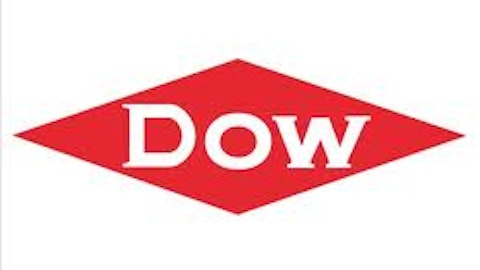The energy industry is here to stay.
Data from the Energy Information Administration reveals that just U.S. natural gas production is expected to increase 44% through 2040. Furthermore, the case shows that shale gas (gas trapped in rocks underground) production will grow 113% through 2040, nearly 4.2% annualized growth. Even if those estimates are not met, the following companies will generate investor value because of their financial positions, business models, or market strategy.
Drilling deeper to determine value
As the 10th largest natural gas producer in America, WPX Energy Inc (NYSE:WPX) is a nimble David taking on brawny Goliaths. Competing against the much larger Exxon Mobil Corporation (NYSE:XOM) and Chevron Corporation (NYSE:CVX), WPX earns its keep by maximizing efficiency and cutting costs.
For a great example, take a look at WPX’s efficiency in water usage and drilling. For reference, Exxon used nearly 2.1 billion barrels of freshwater for its well operations in 2012, an 11% reduction from the prior year. Using a conservative estimate of 31 gallons per barrel, Exxon Mobil Corporation (NYSE:XOM) used roughly 65.1 billion gallons of freshwater in 2012.
Additionally, the Marcellus Shale wells located primarily in West Virginia, New York, and Pennsylvania often take between 20 and 30 days to be drilled before they can produce gas.
Unlike the giants, WPX Energy Inc (NYSE:WPX)’s structure enables it to move quickly and effectively to capitalize on opportunities. Its Q1 2013 report states:
We’ve cut drilling time by more than half, to an average of 8 days on our Valley wells…. Moreover, simultaneous operations (SIMOPS) allow us to complete and produce on the same pad at the same time, resulting in significant efficiencies and getting volumes online faster…. And we recycle 100 percent of the water we use at our own water management facilities, leading to a reduction of 90,000 truckloads of water…. Our new record drilling time for a Marcellus well is 10.8 days.
Using a high estimate of 10,000 gallons for a tanker truck’s carrying capacity, WPX Energy saved over 900,000,000 gallons of fresh water in 2012. The icing on the cake is that its shares trade around $20 with a book value per share of just under $26. Its balance sheet is drill proof (see below table for comparison).
Even those who may be bearish toward the energy industry must consider Ultra Petroleum Corp. (NYSE:UPL). Portfolio Manager James Roumell likes the firm because of its low cost production strategy. As he describes, the industry median costs associated with bringing natural gas to the surface add to about $6.31 per Mcfe, or 1,000 cubic feet. The same process only costs Ultra Petroleum $3. So, if gas prices increased from $3.50 to $4.50 per Mcfe, for example, Ultra Petroleum would double its EBITDA from $600 million to $1.2 billion.
Compared to WPX, Ultra Petroleum Corp. (NYSE:UPL)’s balance sheet does not seem strong. Especially in proportion to its earnings and assets, the firm’s liabilities, which help fund capital expenditures, are high. However, according to its 2012 Message to Shareholders, Ultra Petroleum “incurred a ceiling test write down totaling $3 billion.”
Basically, Ultra Petroleum followed SEC regulations and therefore realized an exorbitant non-cash charge (more about ceiling write downs can be found here). Other than showing a reduction in profitability for reserves, the write down wreaked havoc on its financial statements.

With first-quarter earnings of $0.38 per diluted share, Ultra Petroleum proved that its low-cost strategy based on field operational efficiencies, low overhead, and fiscal responsibility can weather pricing storms. If natural gas prices rise, you definitely want to own this stock.

With first-quarter earnings of $1.76 per share and a remarkably strong balance sheet, Apache Corporation (NYSE:APA) continues to generate investor value. The company announced that it will divest $4 billion in assets by year’s end. The proceeds will be used to pay down additional debt, increase the firm’s cash position, and purchase up to 30 million shares.
While Apache Corporation (NYSE:APA) did not announce how the cash will be used, the capital provides a cushion if natural gas prices drop. Additionally, with an exceptional book value near its current trading price and a large P/E ratio compared to industry giants, Apache still has room to grow.

Investors looking at energy giants should consider BP plc (ADR) (NYSE:BP) over Exxon. Even though BP’s P/E ratio and EPS is lower, it trades close to its book value. If the energy market crashes, Exxon investors will likely endure a much larger loss — and still not even own shares equivalent to the book value of the firm.
BP plc (ADR) (NYSE:BP) also boasts an enormously high dividend, particularly within the energy sector. And, like Exxon, considering its global operations and the upswing potential for oil and natural gas, BP is ready for additional growth.

Furthermore, the company continues environmental initiatives to earn public trust. For example, BP invested over $25 billion to cover damages and repair the Gulf of Mexico where its 2010 Deepwater Horizon spill occurred. Furthermore, the company expects to invest a minimum of $4 billion in the region for oil development and exploration—indirectly supporting the local economy while expanding its operations.
Why investors should care
WPX Energy, Ultra Petroleum, Apache Corporation (NYSE:APA), and BP plc (ADR) (NYSE:BP) all fit a variety of asset allocations and can be used to achieve different investment goals. But they all boast a common denominator: They’re trading close to or below their book values with growth potential moving forward.
Brendan Marasco has no position in any stocks mentioned. The Motley Fool recommends Ultra Petroleum. The Motley Fool owns shares of Apache and Ultra Petroleum and has the following options: Long Jan 2014 $30 Calls on Ultra Petroleum, Long Jan 2014 $40 Calls on Ultra Petroleum, and Long Jan 2014 $50 Calls on Ultra Petroleum.
The article 4 Firms With Growth Potential Near or Below Book Value originally appeared on Fool.com and is written by Brendan Marasco.
Copyright © 1995 – 2013 The Motley Fool, LLC. All rights reserved. The Motley Fool has a disclosure policy.



